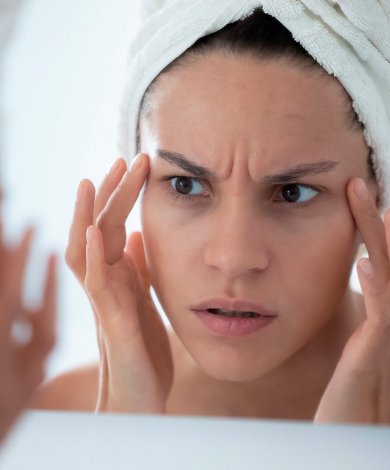Secret Santa Sale – Get Up to 30% Off + Exclusive Pouch & Gloves on min spend of Rs. 1999/-
Free shipping on all orders
Free Trial-Kits on all orders
₹ 0
₹ 0
₹ 0
Secret Santa Sale – Get Up to 30% Off + Exclusive Pouch & Gloves on min spend of Rs. 1999/-
Free shipping on all orders
Free Trial-Kits on all orders


UNDERSTAND MY SKIN
The number one enemy for sensitive skin is all the aggressive factors that little by little disrupt its balance. Our skin is our first defence system against numerous irritants. Everyday, we put makeup on our face, live and work in an environment that is ever more polluted and contend with the impurities our own bodies produce naturally. A well-chosen face cleanser is essential for maintaining the skin’s balance and limiting the classic ways in which sensitive skin shows itself.

Whereas before sensitive skin used to be something marginal, it has slowly but surely spread throughout the world. It was underestimated for quite some time, since having sensitive skin starts with a sensation, which is obviously subjective. And yet the feeling of discomfort is legitimate and goes beyond skin that feels tight, tingles, burns and itches.
All these signs are triggered by numerous factors, which normally shouldn’t have any effect on the skin, unless the skin barrier is overwhelmed by the number of irritants and their non-stop onslaught. Worldwide, sensitive skin syndrome affects 60% to 70% of women and 50% to 60% of men.



Sensitive skin can affect anybody, but it is more common in women and patients who have a pre-existing skin condition like atopic eczema, rosacea and other forms of dermatitis.

Skin is the body’s largest organ. It’s our natural barrier between ourselves and the world around us. However, it is not impenetrable. On the contrary, multiple exchanges occur at skin level: water loss, sebum, flaking skin… It’s this relative permeability that also makes it possible for care products to be effective!
Usually, skin is designed to withstand occasional irritants from the surroundings. Why does sensitive skin overreact to everything? First because the skin's barrier doesn’t correctly fulfil its role. And yet, from birth and throughout our life, skin is our first line of defence, protecting us against potential threats, which are numerous. Each day, our skin, and our face in particular, accumulates all kinds of dirt. Skin has biological protection systems, but they can be insufficient or weakened, since the changes in our modern environment have led to an increase in all types of pollution. Today, the skin's ecosystem has a much harder time keeping its natural balance.
Some cosmetics contain ingredients that are harmful for skin over the long term. Included are mineral oils and silicones, which can obstruct the skin’s pores and smother it bit by bit. It’s important to keep an eye on product composition for both makeup and skin care. Removing makeup every night is obviously compulsory, as long as the method used respects the skin’s balance.

This is a real public health problem, recognised by the World Health Organization. Indoors and outdoors, air is full of ambient pollutants, which are found in skin and hair: dust, fine and ultra fine particles (exhaust gas, combustion heating, cigarette smoke…), heavy metals (lead, mercury, arsenic…), gaseous pollutants (ozone, nitrogen dioxide, carbon monoxide…), volatile organic compounds (exuded by plastic, carpet, paint, furniture…), without forgetting pollen, potentially highly allergenic. All of these invisible enemies have a direct impact on skin.

These come from the skin’s own metabolism: sweat, dead cells tied to flaking skin, sebum… These impurities can alter the skin’s normal biological functioning. It is therefore essential to cleanse skin.

Composition varies according to location. Overall, tap water tends to be full of bacteria, calcium deposits and other residues that are potentially irritating for the epidermis. It can therefore provoke skin irritations and reactions, especially if the skin's barrier is weakened. This should be taken into account when choosing a face cleanser for sensitive skin.

The Covid-19 pandemic introduced a new irritant for skin. Wearing a mask is obviously essential for protecting ourselves and others from contagion. But it frequently produces new skin problems. ‘Maskne’ refers to acne that is tied to wearing a mask, with spots located on the bottom half of the face. People with sensitive skin have noticed other effects: irritation, redness, itching, stinging and sometimes even flare-ups of eczema. Here, too, washing your face is critical to restoring skin to health.








Wearing a mask generates occlusion and maceration of skin, which exacerbates irritation caused by friction produced by the mask. It creates a hot and humid environment favourable to the production of sebum and the appearance of spots (acne or inflammatory lesions).

The different aggressive factors generate free radicals, which create constant oxidative stress and overwhelm the skin’s own ability to defend itself. This oxidative stress then generates harmful particles responsible for changes in the skin’s barrier. Redness, irritation, stinging and itching all appear, all signs of inflammation, which further increases oxidative stress. The real vicious circle that exacerbates skin irritation and all the symptoms of sensitive skin has settled in.

Cleansing your face daily is the best way to avoid the accumulation of makeup, pollution and impurities produced by our own body. It therefore
The barrier function’s effectiveness depends on a precise day-night cleansing cycle
Cleansing skin is therefore the first caring step – and indeed an essential one. It’s important to choose a cleanser for sensitive skin, such as cleansing micellar water.

